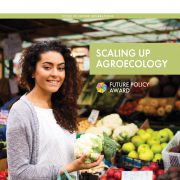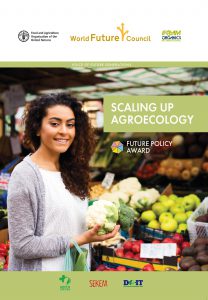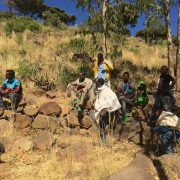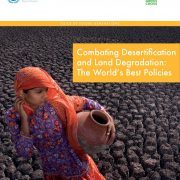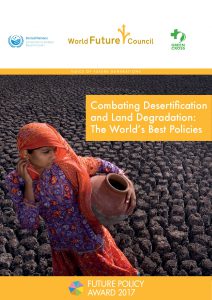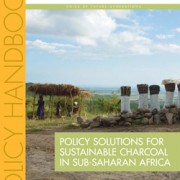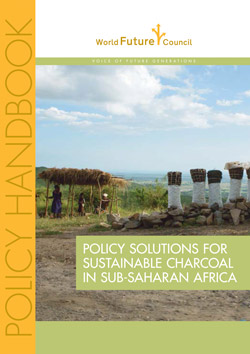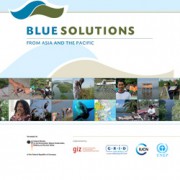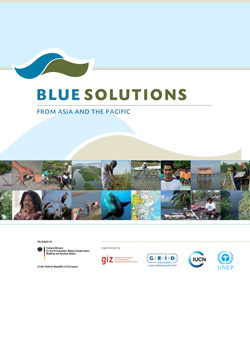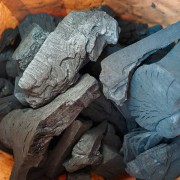100% Organic Sikkim, World Future Councillor Vandana Shiva and Director Alexandra Wandel in the German Parliament with Former Minister for Food and Agriculture Renate Künast
On Thursday 29th November, Berlin provided a solace of winter sun after a week of heavy-hanging weather to welcome World Future Councillor and world-renowned environmental activist, Prof. Dr. Vandana Shiva, and the Director of the World Future Council, Alexandra Wandel in the capital’s Bundestag Complex. They were invited by Member of Parliament, Renate Künast, former Minister for Food and Agriculture to discuss the agro-political situation in India, the world’s first 100%-organic state and Gold-winner of the Future Policy Award 2018, Sikkim, as well as the road-map to sustainable global agriculture.
“Sikkim shows that we can turn this around and walk the agro-ecological path.”
Vandana Shiva
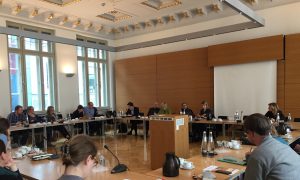 In a simple yet elegant conference room, the Honourable Künast welcomed her guests and 30 audience members from the German Parliament, European environmental institutes and the general public, and opened the discussion. The conversation quickly turned to agriculture in India. As a country whose agricultural face was profoundly transformed under the Green Revolution of the mid-20th Century, India is a notable example of the extreme conflicts and contrasts in the current global food system. Councillor Shiva described the horrors incurred by input-intensive agriculture in the country, which she has repeatedly encountered across four decades of environmental activism. An ongoing suicide-epidemic of hundreds of thousands of debt-ridden farmers, a ‘cancer train’, from the Punjab the Rajasthan, and a youth driven from agriculture and into drug abuse were some of the images she invoked. But the old techniques based on an old reductionist “lego-logic” have been recognised and, by some, reversed in the most radical and inspiring ways.
In a simple yet elegant conference room, the Honourable Künast welcomed her guests and 30 audience members from the German Parliament, European environmental institutes and the general public, and opened the discussion. The conversation quickly turned to agriculture in India. As a country whose agricultural face was profoundly transformed under the Green Revolution of the mid-20th Century, India is a notable example of the extreme conflicts and contrasts in the current global food system. Councillor Shiva described the horrors incurred by input-intensive agriculture in the country, which she has repeatedly encountered across four decades of environmental activism. An ongoing suicide-epidemic of hundreds of thousands of debt-ridden farmers, a ‘cancer train’, from the Punjab the Rajasthan, and a youth driven from agriculture and into drug abuse were some of the images she invoked. But the old techniques based on an old reductionist “lego-logic” have been recognised and, by some, reversed in the most radical and inspiring ways.
“A new knowledge of an old knowledge will be the future of humankind.”
Renate Künast
Over the past 45 years, Sikkim state in the Himalaya Region of India has made the transition to 100%-organic agriculture. Model farms, farmer field schools and a total ban on non-organic food-products have been instrumental in training over 65,000 farmers across 75,000 hectares into sustainable, fully-organic methods. World Future Council Director Wandel described how this unprecedented and entirely-successful transformation has earned the region countless benefits for its farmers and the health and well-being of the local people, as well as a 50% boom in tourism and recognition on the global stage. It is for this tireless work in organic agriculture that Sikkim was awarded the Gold Future Policy Award 2018 at the ceremony in front of 170 heads of state in Rome. Whilst 51 other nominations to the post were extensively researched and other policies from Denmark, Ecuador and Brazil received a Silver recognition, Sikkim’s efforts proved by far by the most exemplary.
“A truly visionary and holistic approach to agriculture.”
Alexandra Wandel
As part of her work with the Parliamentary Group on India, Hon. Künast recently had the opportunity to visit Sikkim experience their ground-breaking (and ground-making) work first-hand. She said she was wholly impressed by how the state uses public money to provide possibilities and livelihood dignity for its citizens in organic agriculture. Their valuing of traditional knowledge fuses with the goodness of the people in an atmosphere of respect for one another and the Earth.
“Sikkim is the light. The struggle must continue.”
Vandana Shiva
After all speakers had passionately shared their experiences and knowledge, the floor was opened up for questions from the audience. The opportunities and risks of digitalisation of agriculture came first, and Councillor Shiva was quick to insist on the stark difference between the right to technology and free internet, versus the forced digitalisation of agriculture. We must remain wary of the dangers of commodification of agricultural data for use by big companies. “Defining the commons in this new context,” said Prof. Dr. Shiva, “is extremely important.”
A second audience member asked how Sikkim was perceived at national level – is this the dawn of an organic India? There certainly exist other positive examples, for example, efforts in the Northern state of Ladakh to become organic. However, at national level, major obstacles remain. Vital here is the ongoing commitment to a sustainable vision by all spheres of society.
“We need a real debate across all of our societies or the future is a dead-end. Only food democracy will feed us in 2050.”
Vandana Shiva
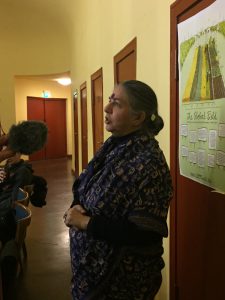 The Director of the World Future Council Alexandra Wandel mentioned that unfortunately not a single German law was nominated for the Future Policy Award on Scaling Up Agroecology and that parliamentarians were invited to have a look at the awarded policies, including the organic policy of Sikkim and also the silver award from neighbouring country Denmark which received the Future Policy Silver Award and has the highest share of organic products in the world.
The Director of the World Future Council Alexandra Wandel mentioned that unfortunately not a single German law was nominated for the Future Policy Award on Scaling Up Agroecology and that parliamentarians were invited to have a look at the awarded policies, including the organic policy of Sikkim and also the silver award from neighbouring country Denmark which received the Future Policy Silver Award and has the highest share of organic products in the world.
The event in the German Parliament came a day after the World Future Council and Councillor Shiva were invited to celebrate Bread for the World’s (Brot für die Welt) 60th anniversary in the German Theatre, and proceeded two exciting events at the historic Babylon Cinema in Berlin’s Mitte district. The first – “Vision for Agriculture 2050” [1] [2] – was a debate between Councillor Shiva, Norbert Lemken, Director Agricultural Policy at Bayer and Prof. Dr. Sonoko Dorothea Bellingrath-Kimura of the Leibniz Centre for Agricultural Landscape Research (ZALF). As the audience outed their respective support and outrage, the debate raged over the science behind chemical inputs, the capacity to feed the world and the morality behind this monumental task. After a short break where audience members could inform themselves with Councillor Shiva’s literature and speak with Liam Innis about the World Future Council and the Future Policy Award, the night continued with the screening of “SEED: The Untold Story” [3]. The film, wherein Councillor Shiva is a protagonist follows the rich and treasured history of Earth’s 12,000 year-old food legacy, which continues to be threatened to extinction by – and fight back against – an all-encompassing agro-industry.
“I think it’s time to bring care, sharing, love, the commons and our brains back into the picture of agriculture.”
Vandana Shiva
[1] https://www.2000m2.eu/de/vandana-shiva-visions-for-agriculture-2050/
[2] https://theworldnews.net/de-news/aktivistin-streitet-mit-konzern-vandana-shiva-vs-bayer-lobbyist
[3] https://www.seedthemovie.com
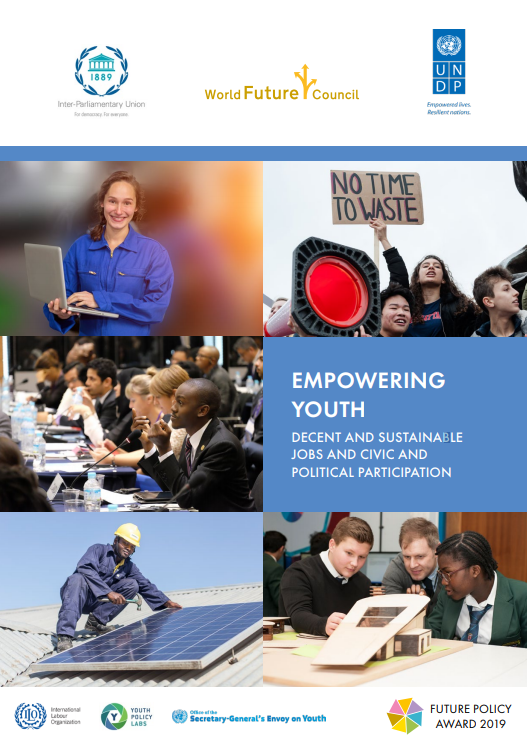
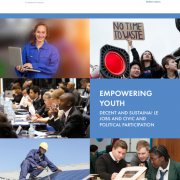
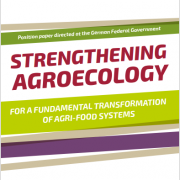
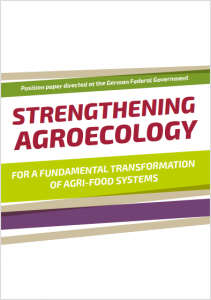
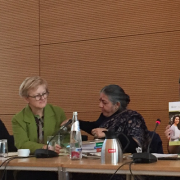
 In a simple yet elegant conference room, the Honourable Künast welcomed her guests and 30 audience members from the German Parliament, European environmental institutes and the general public, and opened the discussion. The conversation quickly turned to agriculture in India. As a country whose agricultural face was profoundly transformed under the Green Revolution of the mid-20th Century, India is a notable example of the extreme conflicts and contrasts in the current global food system. Councillor Shiva described the horrors incurred by input-intensive agriculture in the country, which she has repeatedly encountered across four decades of environmental activism. An ongoing suicide-epidemic of hundreds of thousands of debt-ridden farmers, a ‘cancer train’, from the Punjab the Rajasthan, and a youth driven from agriculture and into drug abuse were some of the images she invoked. But the old techniques based on an old reductionist “lego-logic” have been recognised and, by some, reversed in the most radical and inspiring ways.
In a simple yet elegant conference room, the Honourable Künast welcomed her guests and 30 audience members from the German Parliament, European environmental institutes and the general public, and opened the discussion. The conversation quickly turned to agriculture in India. As a country whose agricultural face was profoundly transformed under the Green Revolution of the mid-20th Century, India is a notable example of the extreme conflicts and contrasts in the current global food system. Councillor Shiva described the horrors incurred by input-intensive agriculture in the country, which she has repeatedly encountered across four decades of environmental activism. An ongoing suicide-epidemic of hundreds of thousands of debt-ridden farmers, a ‘cancer train’, from the Punjab the Rajasthan, and a youth driven from agriculture and into drug abuse were some of the images she invoked. But the old techniques based on an old reductionist “lego-logic” have been recognised and, by some, reversed in the most radical and inspiring ways. The Director of the World Future Council Alexandra Wandel mentioned that unfortunately not a single German law was nominated for the Future Policy Award on Scaling Up Agroecology and that parliamentarians were invited to have a look at the awarded policies, including the organic policy of Sikkim and also the silver award from neighbouring country Denmark which received the Future Policy Silver Award and has the highest share of organic products in the world.
The Director of the World Future Council Alexandra Wandel mentioned that unfortunately not a single German law was nominated for the Future Policy Award on Scaling Up Agroecology and that parliamentarians were invited to have a look at the awarded policies, including the organic policy of Sikkim and also the silver award from neighbouring country Denmark which received the Future Policy Silver Award and has the highest share of organic products in the world.